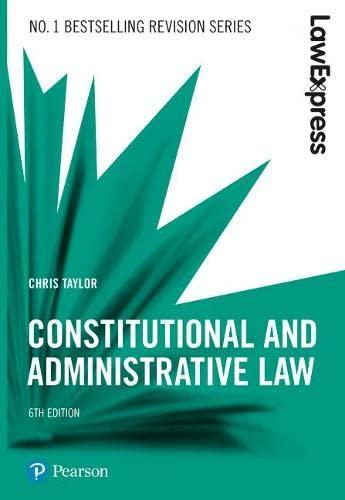Question
Please summarize the second half of Beccaria's fifth article (from similarly, a false idea of utility... onward) Chapter 40 One source of errors and injustices
Please summarize the second half of Beccaria's fifth article (from "similarly, a false idea of utility..." onward)
Chapter 40
One source of errors and injustices is the false ideas of utility held by some lawgivers. It is a false idea of utility that gives higher importance to particular inconveniences than to the general incon- venience, that commands the feelings instead of exciting them, that commands logic to submit. It is a false idea of utility that sacrifices a thousand real advantages for a single chimerical or unimportant disadvantage, that would deprive men of fire because it burns or water because it drowns, and can only remedy evils by destruction.
{{The laws which forbid men to bear arms are of this sort. They only disarm those who are neither inclined nor determined to commit crimes. Can it be supposed that those who have the courage to violate the most sacred laws of humanity and the most important in the civil code will respect the lesser and more arbitrary laws, which are easier and less risky to break, and which, if enforced, would take away the personal freedom - so dear to man and to the enlightened lawgiver - and subject the innocent man to all the annoyances which the guilty deserve? These laws make the victims of attack worse off and improve the position of the assailant. They do not reduce the murder rate but increase it, because an unarmed man can be attacked with more confidence than an armed man. These laws are not preventive but fearful of crime, they originate from the disturbing impression arising out of a few particular cases rather than from a reasonable consideration of the advantages and disadvantages of a universal law.}}
Similarly, a false idea of utility wishes to impose on a multitude of sentient creatures the symmetry and order of brute inanimate matter, and ignores the immediate motives, which alone work constantly and forcibly on the mass of people, in favour of remoter motives whose effect is very brief and weak, unless, that is, some power of the imagination, rare in human beings, compensates for the distance of their object by magnifying it.
Finally, it is a false idea of utility to sacrifice the thing to the name and to separate the public good from the good of each individual. The difference between the state of society and the state of nature is that savage man does not harm others except to benefit himself, whereas social man is sometimes moved by bad laws to offend against others without doing himself any good. The despot fills the souls of his slaves with fear and dejection, but these sentiments rebound on him with greater force to torture his own soul. The more solitary and domestic that fear is, the less it endangers whoever uses it as a means to his own happiness; but the more public it is, and the greater the number of men it inflames, the easier it becomes for a rash, desperate or daring man to compel others to serve his own ends, arousing in his followers feelings which are the more grateful and more enticing, the greater the number of men the risk falls upon. For the value which the oppressed place on their own lives decreases in proportion to the misery they are undergoing. This is the reason why offences cause new offences, for hatred is a more longlasting feeling than love, inasmuch as the former gathers strength from continued activity, which weakens the latter.
Step by Step Solution
There are 3 Steps involved in it
Step: 1

Get Instant Access to Expert-Tailored Solutions
See step-by-step solutions with expert insights and AI powered tools for academic success
Step: 2

Step: 3

Ace Your Homework with AI
Get the answers you need in no time with our AI-driven, step-by-step assistance
Get Started


